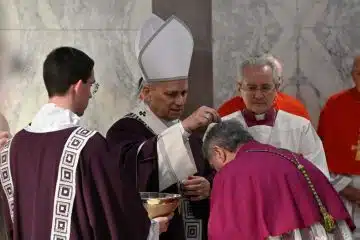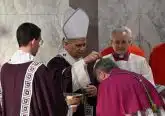God is not dead
March 30, 2012
By Father Earl Fernandes
Friedrich Nietzsche claimed that “God is dead.” The notion that God is dead, or even the mere loss of a sense of God, has a profound impact on values in the world.
Nietzsche knew the consequences of the decline of Christian faith, writing: “When one gives up the Christian faith, one pulls the right to Christian morality out from under one’s feet. This morality is by no means self-evident… By breaking one main concept out of Christianity, the faith in God, one breaks the whole: nothing necessary remains in one’s hands.”
A few years ago, Sue Grant wrote Standing on His Own Two Feet: A Diary of Dying. The book documents the struggle of a young man in his 20s who is stricken with cancer. He attempts to cope with his illness, but after a two-year battle, succumbs to it. The book depicts the human struggle, the efforts of modern medicine, the concern of family members and heroism of care-givers, but it never once mentions God, prayer or the church. This is not too far from Nietzsche’s claim that “God is dead.”
Atheists are certain that God doesn’t exist, and they live as if God doesn’t. The same cannot be said about agnostics, who are not sure or are unable to know if God really exists, who lack the gift of a firm faith. They say, “Maybe God exists, maybe He doesn’t. Everything is relative.” Others say, “I have my truth; you have your truth.” In such a situation, everything, including moral norms, becomes fluid and uncertain. God is either the foundation of being or He isn’t. No one bases the foundation of living and dying on a “maybe.” The consequence of agnosticism is that God becomes insignificant. God is “pushed” to the margins of the page- of people’s lives — or even off the page and out of their lives.
Until the modern period, people thought of good as better than evil. If God is dead, can we still say this? In a Christian ethic, the foundation and the guarantee of the “good” is God. Now if God is dead, the foundation of the good becomes uncertain. There are no longer absolutes. Everything becomes relative and subjective; this in turn threatens the values system of the world.
This type of thinking leads even the committed Catholic to despair. What will we do? How will we respond? Recently, I went to Brown County for a tour of Chatfield College, guided by John Tafaro, the college’s president. I was privileged to meet a few of the Ursuline Sisters and to visit the campus, chapel and archives. Near the end of the tour, we stopped in the cemetery where many of the Sisters are buried. It was particularly moving to see Mother Julia Chatfield’s tomb, along with the graves of the first Sisters who accompanied her and committed themselves to educating young women, especially in the Catholic faith and in the arts. Did these religious women leave family, friends and country and consecrate their lives on the basis of a “maybe?” I think not! Their deep faith lingers in Brown County, heralding a challenge call for a new evangelization — a re-evangelization.
The Holy Father has called for a Year of Faith — to commemorate the 50th anniversary of the opening of the Second Vatican Council and the 20th anniversary of the promulgation of the Catechism of the Catholic Church. The Year of Faith offers the opportunity to renew and deepen faith in God, revealed in Jesus Christ. The Year of Faith begins in October. What will you do to proclaim that God is not dead?
Father Fernandes is an assistant professor of moral theology and dean of the Athenaeum of Ohio/Mount St. Mary’s Seminary.













